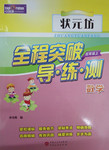题目内容
The teacher asked us ________ so much noise.
A. don’t makeB. not make
C. not makingD. not to make
练习册系列答案
 状元坊全程突破导练测系列答案
状元坊全程突破导练测系列答案 直通贵州名校周测月考直通名校系列答案
直通贵州名校周测月考直通名校系列答案
相关题目
题目内容
The teacher asked us ________ so much noise.
A. don’t makeB. not make
C. not makingD. not to make
 状元坊全程突破导练测系列答案
状元坊全程突破导练测系列答案 直通贵州名校周测月考直通名校系列答案
直通贵州名校周测月考直通名校系列答案